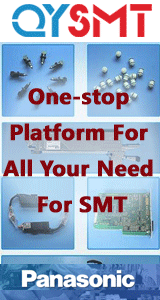Top executives from leading electronics companies across the United States are in Washington, D.C. this week for IPC IMPACT 2014, educating Congress and other policymakers on key policy issues that are critical to the electronics industry and their communities.
Among the issues on their agenda, members of IPC — Association Connecting Electronics Industries® are calling on Congress to pass the Revitalize American Manufacturing and Innovation (RAMI) Act of 2013 (H.R. 2996 and S. 1468), which would establish a National Network for Manufacturing Innovation (NNMI). The bill enjoys broad bipartisan support in Congress.
The electronics industry executives will meet with members of Congress, senior White House staff and key agency officials to advocate for smart reforms in manufacturing policy, chemicals recycling under the Toxic Substances Control Act (TSCA), and maintaining a robust defense industrial base. IPC member companies represent an estimated 800,000 U.S. employees in almost every state and in a variety of industry categories.
IMPACT 2014 participants include:
- Richard Lies, CEO and general manager, Chemcut;
- John Vaughan, president, Circuit Solutions;
- Bhawnesh Mathur, president and CEO, Creation Technologies;
- Marc Peo, president, Heller Industries Inc.;
- Joseph O'Neil, president, Hunter Technology;
- Jason Marsh, vice president, Insulectro;
- Raymond Sharpe, president and CEO, Isola Group SARL;
- Mark Wolfe, director of supply management, John Deere Electronic Solutions;
- Mikel Williams, CEO, president and director, JPS Composite Materials;
- Robert Black, president and CEO, Juki Automation Systems;
- Steven Betza, corporate director, advanced manufacturing & development, Lockheed Martin;
- Everett Frank, vice president, Optimum Design Associates;
- Jim Woodbridge, vice president for government affairs, SAIC;
- Brent Grazman, vice president of quality, Viasystems Group;
- Carsten Salewski, president and CEO, Viscom; and
- Matt Turpin, president of Zentech Manufacturing.
“We’re here to advocate for policies that support a strong and innovative manufacturing economy,” said John Mitchell, president and CEO of IPC. “A healthy electronics industry is critical to the economy and national security. We need government to foster a positive environment for business that enables the creation of more jobs and innovative products for consumers.”
IMPACT 2014, along with the recent expansion of IPC’s government relations team and IPC’s advocacy work around the world, demonstrates a commitment to strengthen the electronics industry’s voice in the halls of government.
IPC (www.IPC.org) is a global industry association based in Bannockburn, Ill., dedicated to the competitive excellence and financial success of its 3,400 member companies which represent all facets of the electronics industry, including design, printed board manufacturing, electronics assembly and test. As a member-driven organization and leading source for industry standards, training, market research and public policy advocacy, IPC supports programs to meet the needs of an estimated $2 trillion global electronics industry. IPC maintains additional offices in Taos, N.M.; Washington, D.C..; Stockholm, Sweden; Moscow, Russia; Bangalore, India; Bangkok, Thailand; and Qingdao, Shanghai, Shenzhen, Suzhou, Chengdu and Beijing, China.
 »
»





